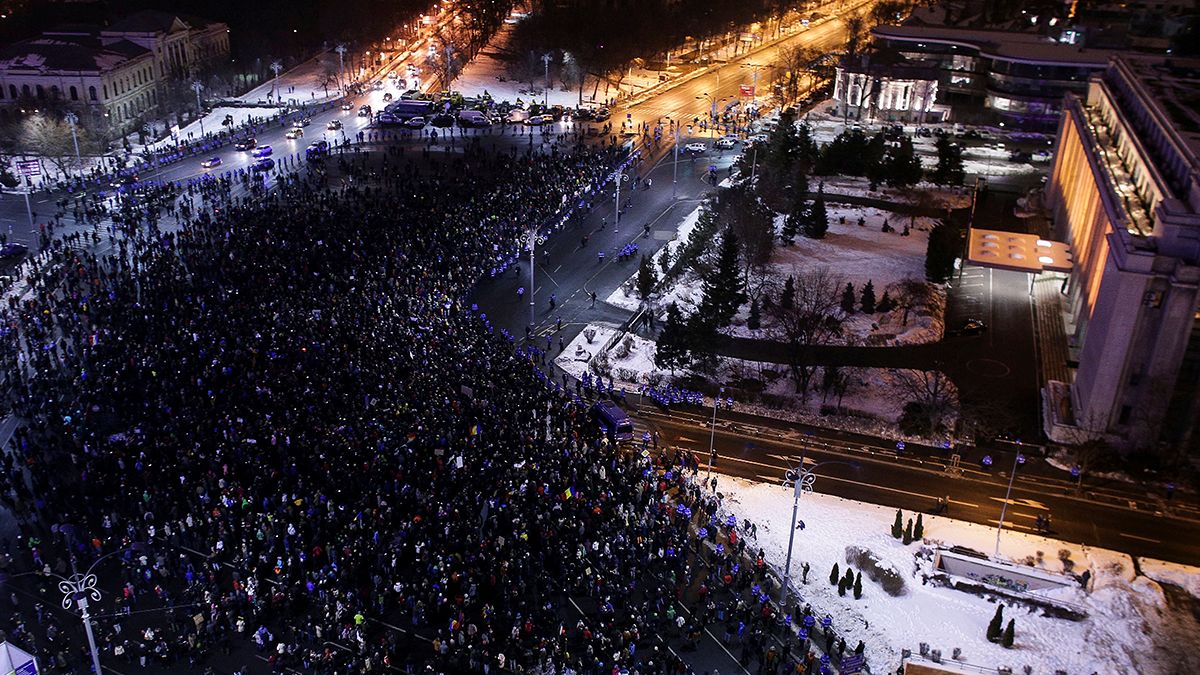The prime minister has said the government will not repeal a decree softening the official stance on corruption, despite protests and legal challenges.
Romania’s prime minister is digging in over his government’s controversial decree widely seen as going soft on corruption.
Sorin Grindeanu said on Thursday that the measure that decriminalises some graft offences will not be repealed.
The country’s Constitutional Court – challenged by President Klaus Iohannis and the top judicial watchdog over the decree – says it’s giving all sides a few days to present their arguments and will rule in the next month.
The government, parliament and magistrates have until February 7 to file their arguments. The court says that within 20 days of receiving the documents it will hold a session and rule on the constitutionality of the decree.
If the court does not block it, the measure takes effect within 10 days of its adoption on Tuesday.
The latest moves come amid increasing anti-government protests in parliament and outside.
Two ministers have stepped down on Thursday. The Justice Minister Florin Iordache, the architect behind the decree, has said he is temporarily ceding his duties to his deputy until February 7.
Earlier the Business Minister Florin Jianu quit, saying he couldn’t support the government’s decree.
Romanian media have reported that anti-corruption prosecutors have begun investigating the measure.
They don't plan to back down, despite massive protests and negative international reactions. https://t.co/AMgtUkNNi9
— Romania-Insider.com (@romania_insider) February 2, 2017
Since the government was sworn in last month, its apparent retreat on reforms has caused widespread alarm.
The decree has provoked a no-confidence motion from opposition parties, the court challenge, massive street protests, cries of alarm from several European countries as well as the US and Canada, and a warning from the European Commission.
The parliamentary leader rebuffed the EU in an interview with Euronews.
“I am disappointed with this criticism because the European Commission’s views are usually not founded on the Romanian or international legislation. While being screened for access to the Schengen area, we were asked to contravene our constitution which is a proof either of bad faith or unprofessionalism,” Eugen Nicolicea said.
Across Romania, the decree also brought hundreds of thousands of people onto the streets on Wednesday night – furious at the measure that will protect many politicians from corruption allegations.
The protests were described as some of the biggest demonstrations since the 1989 revolution that brought down communism.
In Bucharest the protest ended in clashes between police and a minority of protesters some described as football hooligans.
The President transparently hinted that the Interior Ministry knew that violent protesters were coming to the… https://t.co/qAmPHuMsaa
— Romania-Insider.com (@romania_insider) February 2, 2017
Also on Thursday, Transparency International reported that at the same time as warning Romania over corruption, the European Commission was shelving plans to publish a “naming and shaming” report on corruption in the EU.
.
EU_Commission</a> quietly shelves anti-corruption commitments while 100,000s protest <a href="https://twitter.com/hashtag/corruption?src=hash">#corruption</a> in <a href="https://twitter.com/hashtag/Romania?src=hash">#Romania</a>: <a href="https://t.co/sfqdE8eRud">https://t.co/sfqdE8eRud</a></p>— Transparency Int. EU (TI_EU) February 2, 2017
